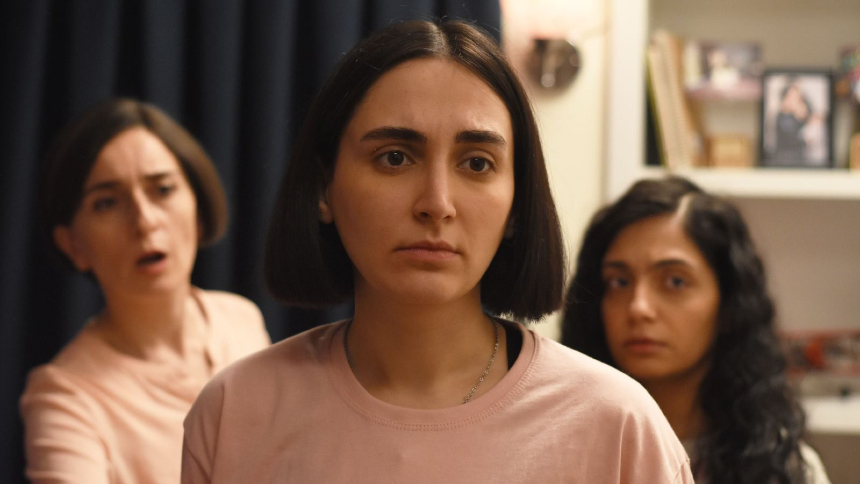New York 2024 Review: THE SEED OF THE SACRED FIG, Striking Tale of Violence and Moral Compromises

Iman (Misagh Zare) has just gotten the much-desired promotion, but asks his family to keep quiet about his new job: he is now an investigating judge in the Revolutionary Court in Tehran.
So, while the very real protests against the state-enforced strict hijab laws roar on the streets, Iman’s new position requires him to sign off on death sentences in bulk, day after day. He’s got full support from his wife Najmeh (Soheila Golestani), who at first is quick to impose a regimen of obedience on their teenage daughters Rezvan (Mahsa Rostami) and Sana (Setareh Maleki).
But the girls grow more and more sympathetic towards the protesters, and even Najmeh’s loyalty slowly turns away from her husband as he becomes increasingly paranoid and ruthless. Oh, there is also a gun in the mix, given to Iman for protection and stashed rather recklessly inside his home.
The Seed of the Sacred Fig, which is currently being screened at the New York Film Festival, was arguably one of the most talked about films in Cannes earlier this year, fueled by the fate of its director Mohammed Rasolouf, who at the time just narrowly escaped yet another severe sentence by flleeing his native country. The images of Rasolouf on the red carpet holding photos of several actors from his film, who weren’t able to leave Iran, made the story told in the film all the more profound. In many ways, Rasolouf also directly continues his previous feature, the winner of 2020 Berlinale, There Is No Evil, which also dealt with the topics of capital punishment and moral compromises.
What makes Rasolouf’s film hit even harder is a feeling, which is actually a fact, that we have definitely seen all of this before. Throughout the history of cinema, different versions of the same story came out from different corners of the world.
The movie, although entierely different in style, that comes to mind the most is The Executioner, a 1963 tragicomedy by the great Spanish classic Luis García Berlanga, made right in the middle of the ongoing Franco’s rule. Recounted in Berlanga’s patented bitter-sweet humorous voice, the film tells the story of an older executioner who lures his son-in-law into taking up the same profession in order to secure an apartment for his family. Despite Rasolouf using an entierely different tone in The Seed of the Sacred Fig, his film still takes after The Executioner in more than one way.
This is also a story of a man who might be able to convince himself he is only making small, insignificant choices that, for him, mostly remain practical. Moral compromises aren’t always directly tied to ideological views; more often than not they come down to someone wishing for something as trivial as a piece of real estate.
And, just like the younger protagonist of Berlanga’s film, Iman doesn’t believe he is a man of violence. Sure, he dispenses death at the stroke of his pen every day, but the gun given to him still seems like a somewhat foreign concept to him. He doesn’t even really know how to go about keeping it, not realizing that it doesn’t matter: violence has a way of taking roots no matter what.
There is another important distinction in regards to The Seed of the Sacred Fig that is directly tied to the specifics of the actual events that inspired it. The divide in Iman’s family starts off as a classic generational one, but soon also becomes gender-based. Women of different generations grudgingly unite in the face of danger once it finds the way into their own reality and stops being abstract, something that only happens "out there".
Aesthetically, Rasolouf mostly sticks to his usual style that is bold and decidedly unsubtle. Unlike many of his colleagues, he almost never speaks Aesopian language, and with the exception of the very telling title and the use of the very symbolic gun, doesn’t really rely on allegories. Instead, the raw footage of the actual protests is included here, once again proving that not a lot of things can feel more surreal than reality itself.
The film screens this week at the New York Film Festival, ahead of its U.S. theatrical release via Films Boutique.
The Seed of the Sacred Fig
Director(s)
- Mohammad Rasoulof
Writer(s)
- Mohammad Rasoulof
Cast
- Mahsa Rostami
- Setareh Maleki
- Niousha Akhshi







